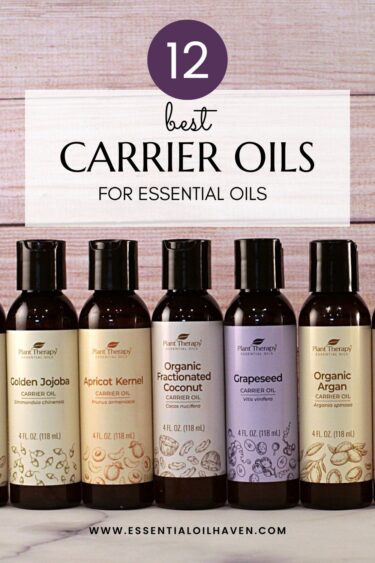
What do you think is the best carrier oil for essential oils? There are definitely plenty of options to choose from.
Carrier oils act as the base for “carrying” the essential oil that is being mixed into it. This dilutes the essential oil before applying it to your skin. They are sometimes also called base oils.
This post contains affiliate links, which means if you make a purchase through these links, I may receive a small commission at no extra cost to you. Read my full disclosure policy here.
Today, I want to show you how to choose the perfect carrier oil for your needs.
When combining carrier oils and essential oils, you’ll enjoy the benefits of BOTH the carrier oil, and the essential oils.
Thus, choosing an appropriate carrier oil can offer unique benefits and skin care properties.
Below is my list of the top 12 best essential oil carrier oils commonly used to mix with your essential oils.
How to Choose Your Carrier Oil
Here are my best tips for choosing a carrier oil to suit your needs:
- Scent & Texture: I’ve included information on scent and texture of each carrier oil, so you can make your best choice. I personally don’t like strong scents, but others might.
- Shelf Life: I also talk about carrier oil shelf life, so you know how long these oils stay good for, and how quickly you should use them up.
- Skin Type: It’s important to use a carrier oil that supports your skin type. You don’t want any clogged pores… am I right?!
- Therapeutic Properties: Each base oil is produced from a different plant material. Thus, the oil will have its own beneficial properties that you’ll want to consider when making your choice.
- Check for Allergies: If you’re allergic to any kind of nuts, be sure to use a carrier oil that is NOT a nut derivative.
Top 12 Carrier Oils Guide
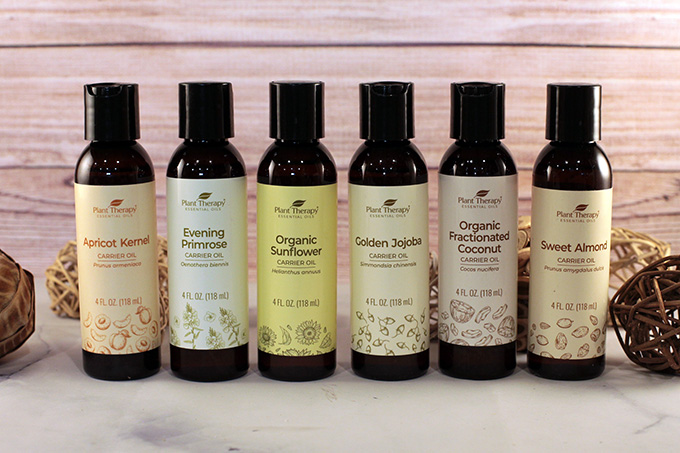
Some of my favorite carrier oils for essential oils.
This is a guide to the best carrier oils in the market, each with its unique properties and benefits.
Whether you’re a seasoned aromatherapist or a curious beginner, I’ve designed this list to help you understand the importance of carrier oils in enhancing the efficacy and safety of essential oils, while also catering to various skin types and needs.
Of course, I “smell-tested” each oil, and have been using them around my home and family. So if you have any questions at all… please don’t hesitate to ask and I’ll be glad to share my opinion and experience.
1. Sweet Almond Oil
The All-Rounder
Sweet Almond Oil was the first essential oil carrier oil I bought, and I’d recommend it any day!
I personally love almond oil because it’s quite inexpensive and great for everyday use.
It is also a very light oil, and very easily absorbed by your skin.
- Scent: Almond oil has a very slight nutty smell, though not overwhelming at all. I find it quite sweet and pleasant actually.
- Shelf life: Almond oil stores reasonably well for up to 1 year.
- Skin type: All skin types.
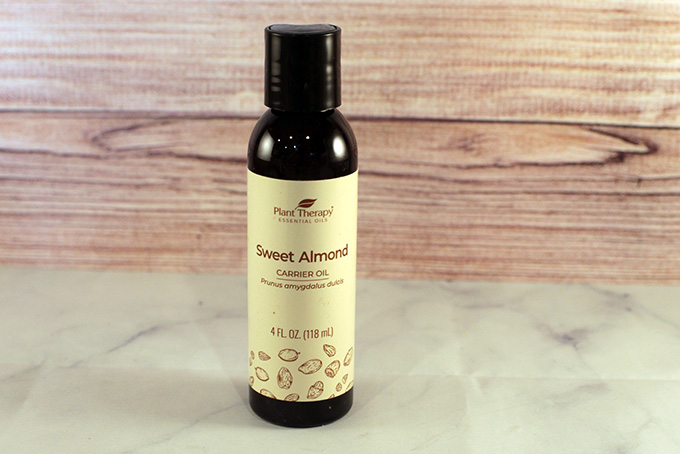
Plant Therapy Almond Oil – 4 fl oz (118mL)
Get it HERE
Sweet Almond Oil is quite nutritious with lots of vitamins including A, B, D and E. It has a high percentage of mono- and polyunsaturated fatty acids, which makes it work wonderfully for all types of skin. Apply it liberally if you suffer from itchy, dry or inflamed skin.
Almond oil is especially useful for a facial massage too, as it helps balance the moisture levels in your skin, helps to improve your complexion, and gives you that special “glow of youth”!
2. Jojoba Oil
The Skin Mimicker
Jojoba oil is Sweet Almond Oil’s most natural match. If combined, the two oils have qualities that are closest to the natural oils of our own skin, making them great for all applications from massage to cosmetics.
- Scent: It doesn’t really have much scent on its own.
- Shelf life: Unlimited. Jojoba keeps indefinitely.
- Skin type: All skin types.
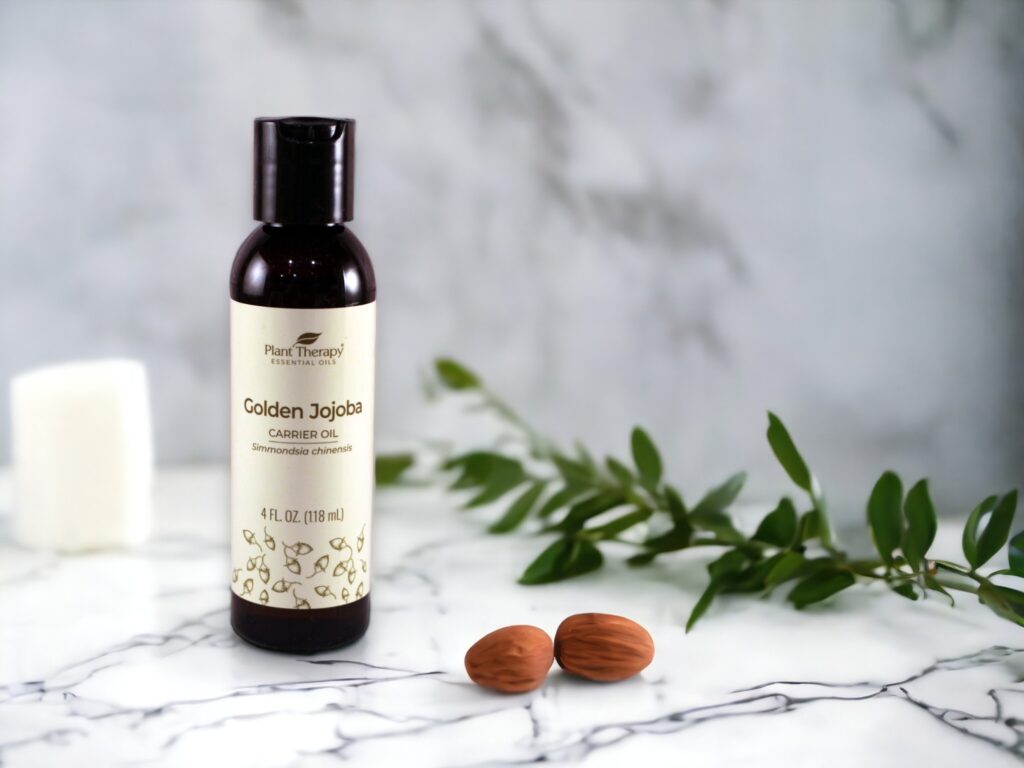
Jojoba Carrier Oil, 4oz from Plant Therapy
Show Now
Derived from the jojoba beans, jojoba oil can be stored for a longer period of time compared to other carrier oils. It has an almost indefinite shelf life.
Jojoba oil is easily absorbed by the skin as jojoba oil mimics collagen (the main structural protein of our skin). This makes it relaxing to the skin, especially for those who have hypersensitivity, eczema, psoriasis, acne or blackheads. It’s a great carrier oil choice for irritated skin of any kind.
I know lots of people who would say that Jojoba is their favorite carrier oil.
3. Apricot Kernel Oil
The Lightweight
Apricot Kernel Oil is ideal for dry, inflamed, sensitive, or prematurely aged skin. Its content of oleic and linoleic acid, along with vitamins A and E, offers beautiful skin care benefits.
It is lightweight and absorbs well without leaving a greasy or oily feeling after use. Therefore, it is also recommended for facial application or massage oil recipes.
- Scent: Smells faintly sweet.
- Shelf life: 6-12 months. Best when kept in the refrigerator.
- Skin type: For dry and aging skin.
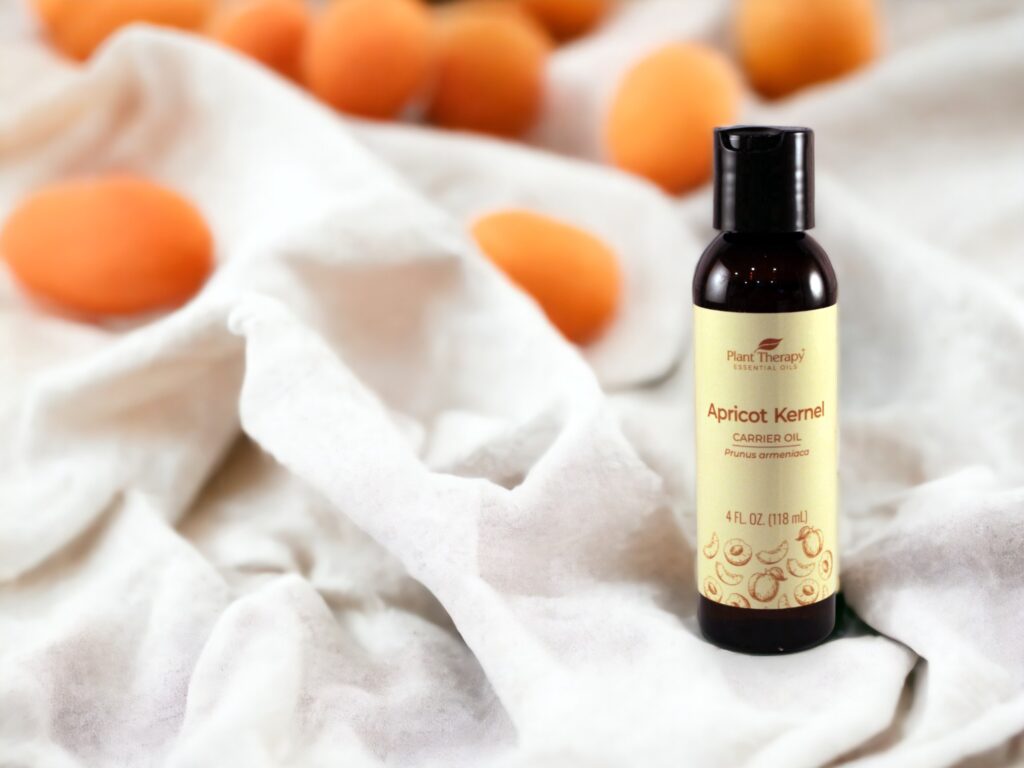
Apricot Kernel Carrier Oil
Check Price
Coming from the kernel of the apricot plant, this carrier oil features a pale yellow color. Be careful though! This carrier oil can leave stains on clothes.
If you keep your Apricot Kernel oil refrigerated, bring it up to room temperature before it using for a massage, otherwise it’ll be pretty uncomfortable.
4. Fractionated Coconut Oil
The Thin & Smooth One
Fractionated Coconut Oil is a super versatile carrier oil, known for its smooth feel on the skin without clogging pores. It’s suitable for all skin types, doesn’t smell like anything, and has a long shelf life.
So it’s super easy to use, and many essential oil enthusiasts use it frequently and happily!
- Scent: None.
- Shelf life: 2 years.
- Skin types: All skin types.
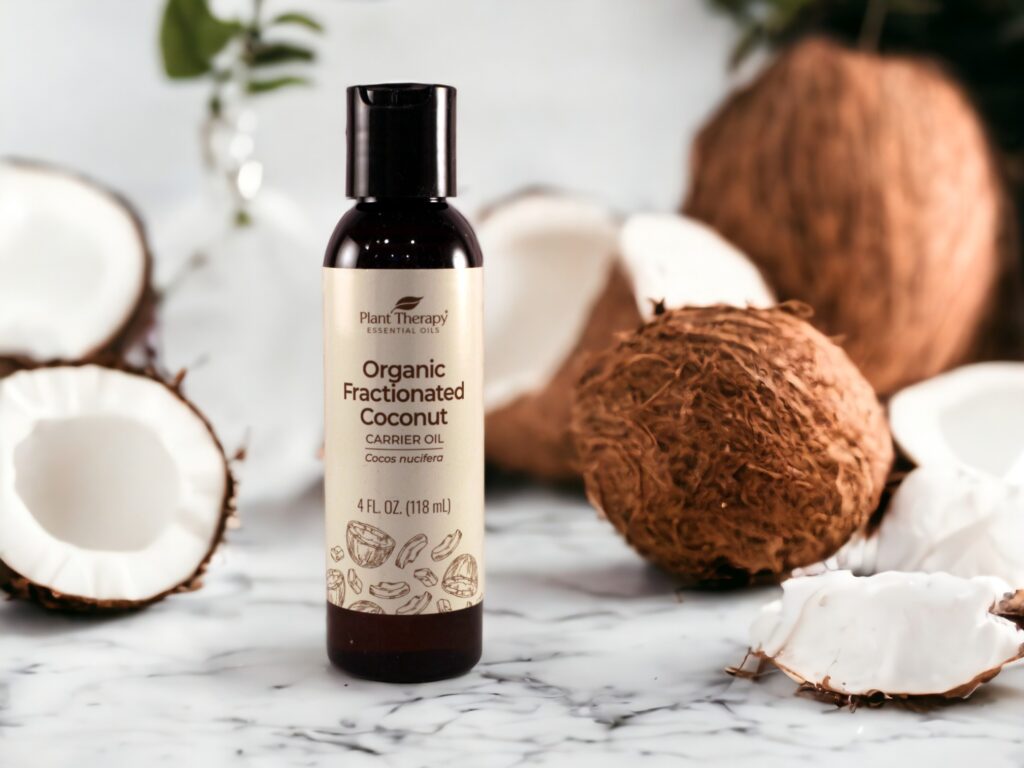
FCO carrier oil (Fractionated Cocnut Oil)
Stock Up Now
Fractionated coconut oil contains a unique combination of fatty acids with powerful medicinal properties. There are countless health benefits to using coconut oil topically to your skin.
5. Grapeseed Oil
The Hidden Gem
- Scent: None.
- Shelf life: Can last up to 1-2 years, but best in small quantities used up within 6 months.
- Skin types: Sensitive, acne-prone or oily skin.
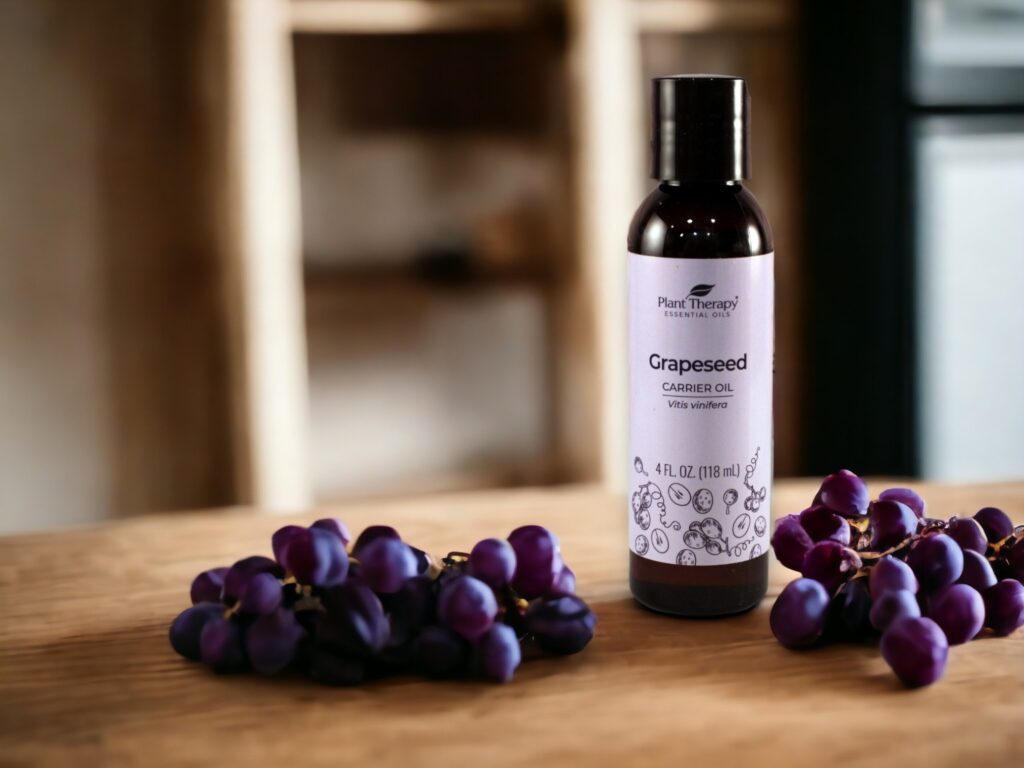
Grapeseed Oil
Get it HERE
Extracted from the seeds of grapes, this light and versatile oil is celebrated for its non-greasy texture and high absorbency.
Plus, it smells like absolutely nothing, which is a big bonus in my books.
Packed with powerful antioxidants, vitamins, and essential fatty acids, Grapeseed Oil is a go-to choice for those seeking a carrier oil that nourishes sensitive, acne-prone or oily skin. It’s a perfect base for many aromatherapy and skincare formulations.
6. Argan Oil
The Skin Restoration Hero
- Scent: Sweet, slightly nutty.
- Shelf life: Around 2 years.
- Skin types: For sensitive, dry and mature skin.
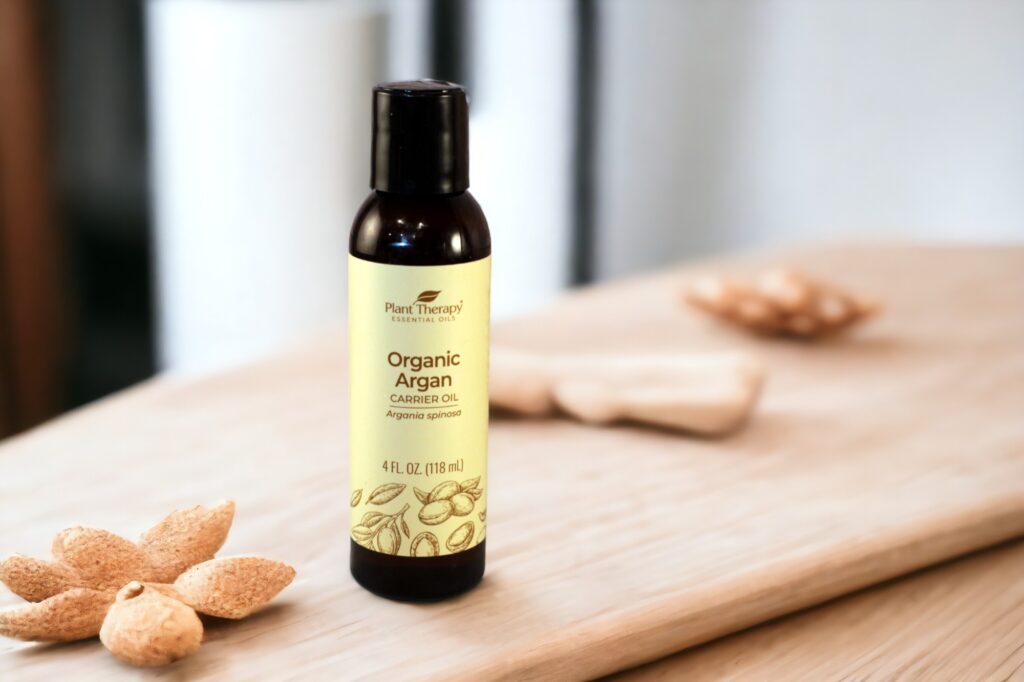
Organic Argan Carrier Oil
Check Availability
This oil is derived from the Argan trees of Morocco, which are nutrient-rich, large, majestic trees.
Argan oil has a sweet, slightly nutty smell to it. Some batches of harvest can have quite a faint smell to it. It depends a little bit on the time the oil was harvested. Spring and summer harvests have a less deep smell, whereas fall and winter crops tend to smell a little more full-bodied.
I love using Argan oil in hand lotions, body creams or soaps.
7. Rosehip Oil
The Anti-Aging Expert
Rosehip Seed Oil is rich in Vitamin C and essential fatty acids, making it excellent for mature skin.
However, Rosehip oil has a somewhat particular scent, so try a smaller size bottle to start. Plant Therapy’s 4 oz bottles are perfect for a few massages and DIY recipes, without being wasteful or bulky.
Rosehip oil also has quite a short shelf life, so use it up quickly before it goes rancid.
- Scent: Herbaceous, somewhat like a herbal tea at the health food store.
- Shelf life: 6 months, then it’ll start smelling rancid or ‘off’.
- Skin types: For mature skin
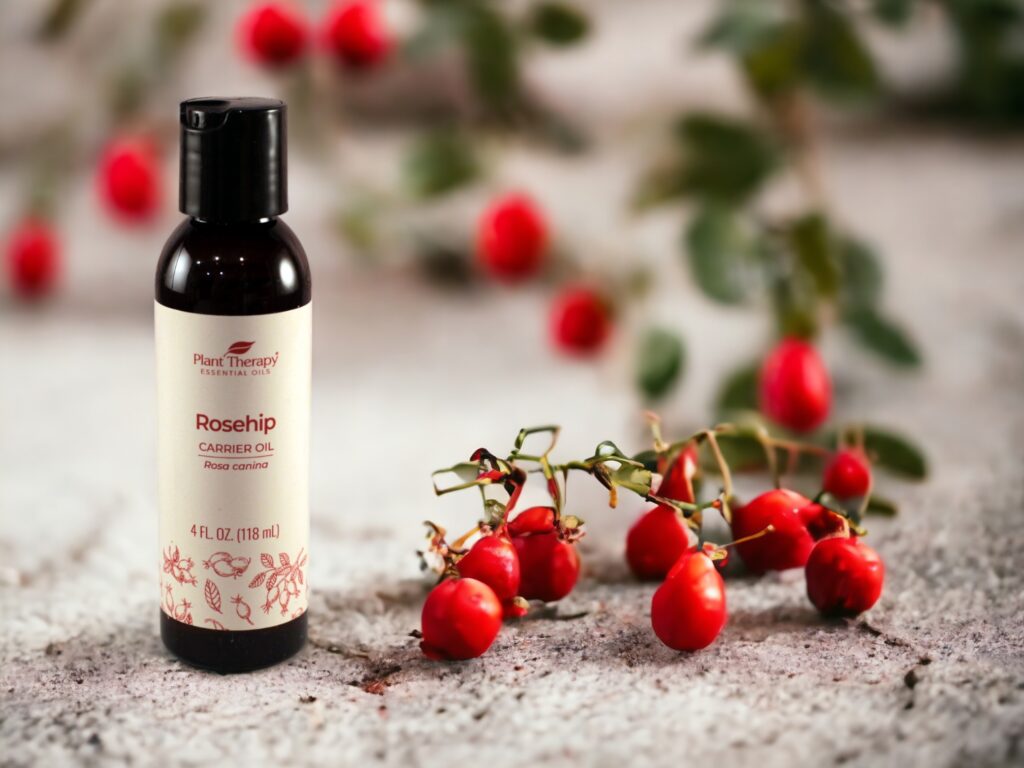
Extra Virgin Rosehip Carrier Oil
Check Price
Use Rosehip oil to treat facial wrinkles, tissue regeneration, UV damage, burns, or scars.
Furthermore, rosehip oil contains a variety of other beneficial compounds, such as flavonoids and lycopene, which contribute to its anti-inflammatory and antioxidant properties. This unique combination of nutrients makes rosehip oil an excellent ingredient for promoting skin health, addressing issues like dryness, aging, and uneven skin tone.
8. Meadowfoam Oil
The Deeply Nourishing One
Meadowfoam carrier oil has exceptional moisturizing properties and stability, making it ideal for a wide range of skincare applications (including DIY recipes).
It not only deeply nourishes the skin, but also offers a degree of UV protection and anti-aging benefits.
- Scent: None
- Shelf life: Up to 2 years
- Skin types: For all skin types, including oily and acne-prone skin.
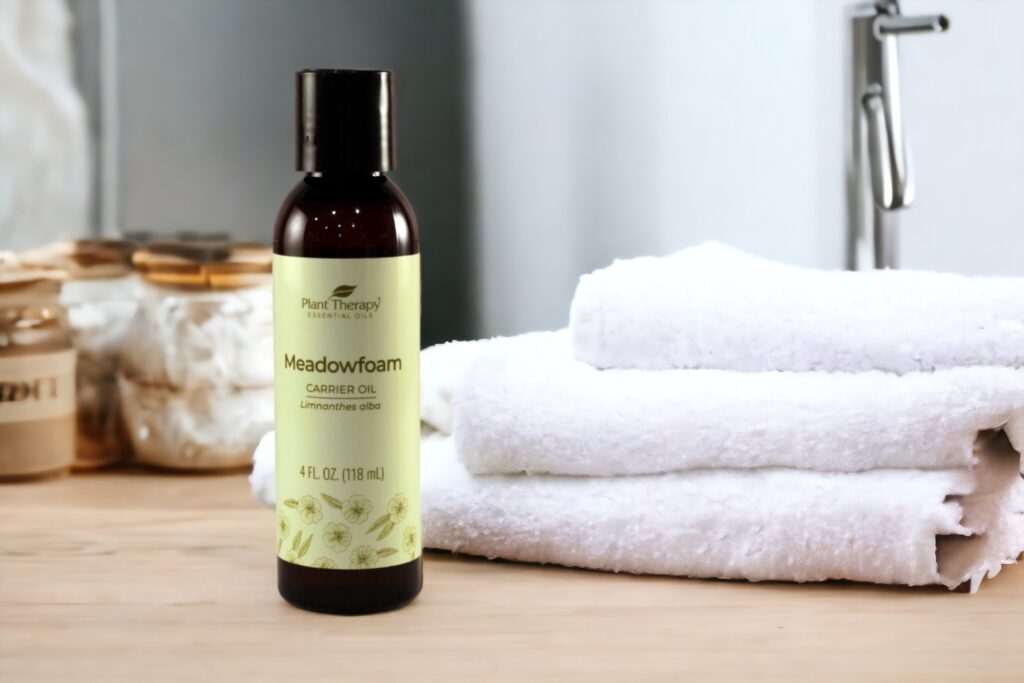
Meadowfoam Carrier Oil 4oz (118ml)
Check Price
Additionally, its benefits extend to hair care, where it adds moisture and shine, and to lip care, providing hydration and a natural sheen.
Meadowfoam oil is widely used in a variety of products, including suntan lotions, massage and body lotions, facial creams, hair care products, cuticle creams, makeup foundations and powders, lipsticks, shampoos, shaving creams, and various balms, due to its versatile and beneficial properties.
The oils’ anti-inflammatory properties further make it effective in soothing irritated, dry or sensitive skin.
9. Evening Primrose Oil
The Luxurious Moisturizer
Evening Primrose oil is invaluable for Aromatherapists. It contains high concentration of Linoleic acid and a small percentage of Gamma Linoleic acid (fatty acids).
However, it smells pretty oily, so it is best blended into another carrier oil such as Sweet Almond Oil. This will also help with the skin sensation after application, and help it feel less ‘greasy’.
- Scent: Oily. Best to blend it with another carrier oil so it’s not so strong.
- Shelf life: 2 years. Keep in a dark, cool place to maintain freshness and achieve maximum shelf life.
- Skin types: For irritated skin.
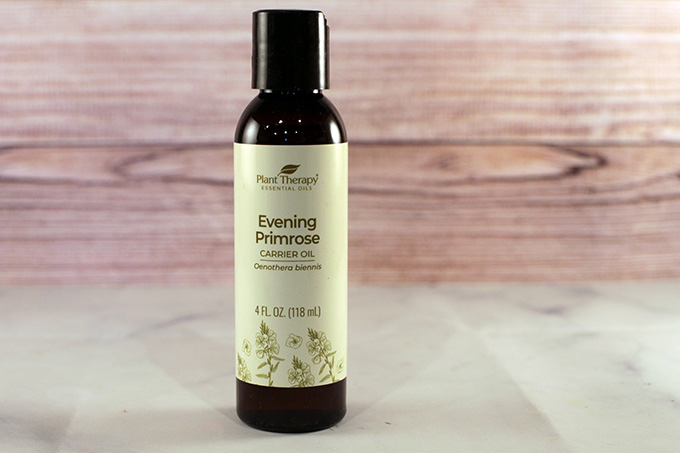
Evening Primrose Oil
Check Price
Used externally, Evening Primrose can be very healing to eczema, prematurely aging skin, dry or scaly skin, dandruff, and small scrapes or bruising.
Evening Primrose can also help minimize wrinkles, dark circles, and tired looking eyes. Its rejuvenating properties can improve firmness and skin elasticity.
10. Sunflower Oil
The Versatile One
Sunflower oil, extracted from the seeds of the sunflower plant, is a versatile and nourishing carrier oil. Rich in Vitamin E, it plays a crucial role in protecting skin cells from environmental stressors like UV rays and pollutants.
Its high Vitamin E content also means the oil has excellent stability, making it less prone to rancidity compared to other carrier oils. If you blend with sunflower oil, you can extend the shelf life of any DIY products.
- Scent: None. Doesn’t smell like anything.
- Shelf life: 1 year if opened, 2 years if unopened.
- Skin types: Any skin type.
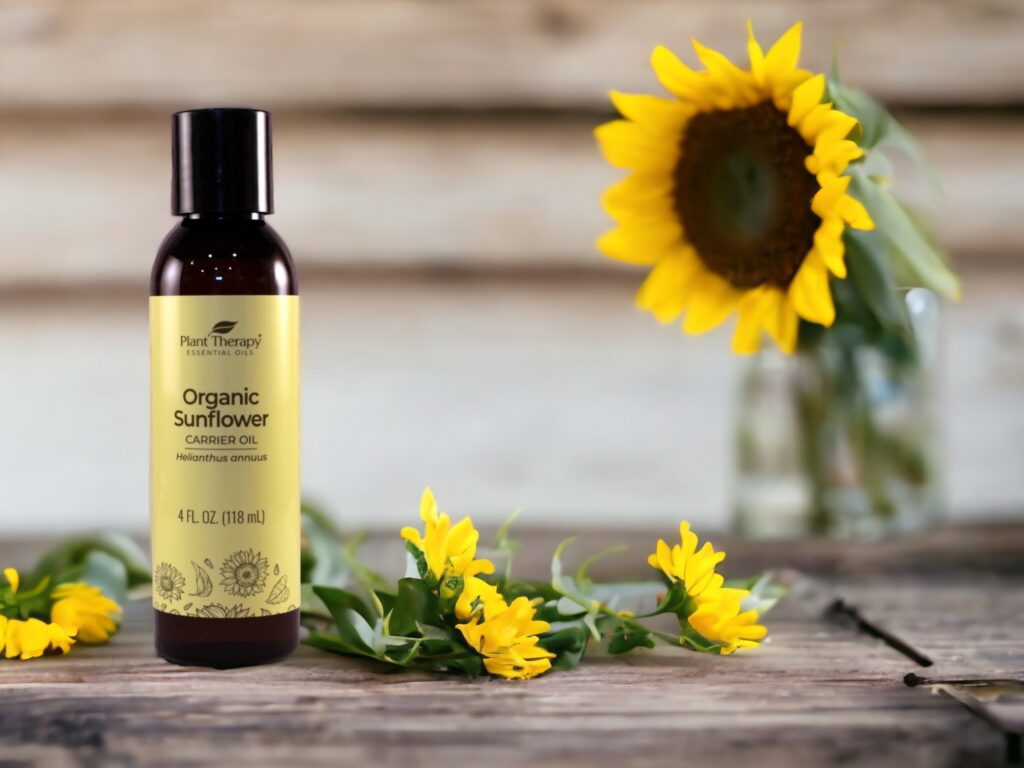
Camellia Seed Carrier Oil
Get it HERE
One of the most notable characteristics of sunflower oil is its light texture and non-greasy feel on the skin. It absorbs quickly, and leaves the skin feeling soft, hydrated, and non-greasy.
Sunflower oil is also rich in linoleic acid, an essential fatty acid that plays a vital role in maintaining the skin barrier and reducing moisture loss. This makes it particularly beneficial for dry, dehydrated, or sensitive skin, as it helps to reinforce the skin’s natural barrier, locking in moisture and providing lasting hydration.
11. Camellia Seed Oil
The Hydrator
Camellia oil is an exquisite oil with deeply moisturizing and rejuvenating skin care qualities. It’s a luxurious addition to skincare routines with a rich composition of oleic acid and vitamins A, D, E, and K.
Its texture is lightweight and silky, making it perfect for hydration without heaviness.
- Scent: Smells a little bit like ground up wheat or barley.
- Shelf life: Up to 2 years in proper storage conditions.
- Skin types: All, especially sensitive and dry skin.
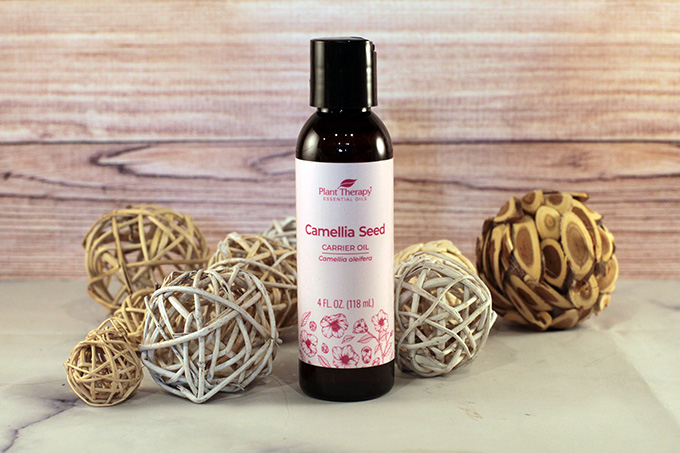
Camellia Seed Carrier Oil
Check Price
Camellia oil is particularly popular in Eastern beauty traditions.
Camellia oil can improve skin elasticity, help minimize the appearance of fine lines, and enhance the skin’s natural glow. Its antioxidant properties help protect the skin from environmental stressors, and can slow down the signs of aging. Additionally, its anti-inflammatory properties make it soothing for irritated or sensitive skin, providing a calming effect.
In hair care, Camellia oil is equally beneficial. It can help strengthen hair follicles, promote shine, and nourish the scalp. Its hydrating properties are particularly effective in taming frizzy hair and preventing split ends, making it a popular ingredient in hair serums and conditioners.
Overall, Camellia oil is a versatile and luxurious carrier oil, cherished for its ability to enhance skin and hair health.
12. Tamanu Oil
Tamanu oil is gaining recognition in the world of natural skincare for its skin nourishing properties.
Rich in fatty acids and antioxidants, Tamanu oil is a powerhouse for skin regeneration and repair. This oil is particularly noted for its ability to promote the formation of new tissue, accelerating wound healing and the growth of healthy skin. This makes it an excellent choice for addressing scars, stretch marks, and various other skin imperfections.
- Scent: Smells quite strong, oily, heavy.
- Shelf life: Up to 2 years.
- Skin types: All skin types, especially damaged or chapped skin.
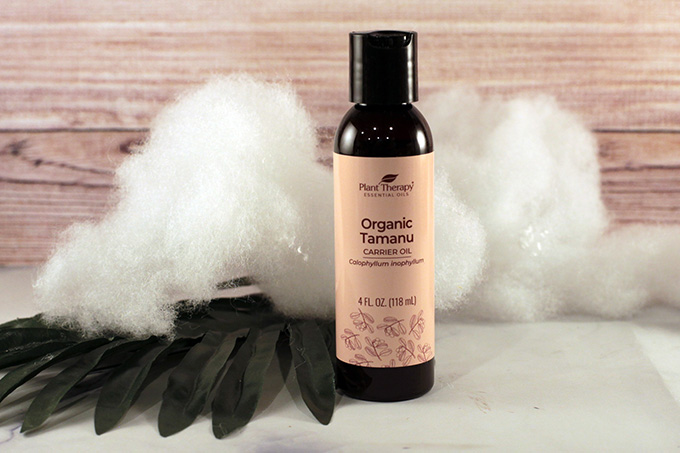
Organic Tamanu Carrier Oil 4oz
Check Price
Tamanu oil is extracted from the nuts of the Tamanu tree, native to Southeast Asia.
Tamanu oil’s potent antibacterial and antifungal qualities also make it a great choice for treating skin irritations and conditions such as acne, eczema, and psoriasis.
Carrier Oils Prices Compared
| Carrier Oil (4oz) | Price * |
| Sweet Almond | $11.49 |
| Golden Jojoba | $15.99 |
| Apricot Kernel | $11.99 |
| Organic Fractionated Coconut Oil | $14.99 |
| Grapeseed | $10.99 |
| Organic Argan (16oz) | $44.99 |
| Rosehip Extra Virgin | $24.99 |
| Meadowfoam | $18.49 |
| Evening Primrose | $15.49 |
| Organic Sunflower | $12.99 |
| Camellia Seed | $15.49 |
| Organic Tamanu | $19.99 |
* Prices at time of writing and subject to change without notice. All sizes 4 oz, except Argan oil size is 16 oz.
How to Use Carrier Oils
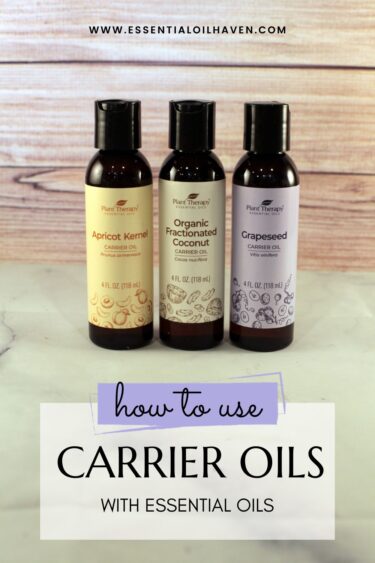
Use a carrier oil to dilute your essential oils prior to topical application.
If in doubt, do a skin patch test for the carrier oil you’re considering. Apply the carrier oil to the inside of your forearm and wait 24 hours to see if you have a reaction. Check for redness or itching.
FAQ
What is the Difference Between Essential Oil and Carrier Oil?
Essential oils are concentrated plant extracts with potent properties, while carrier oils are fatty oils used to dilute the essential oils for safe topical application.
What are Some of the Benefits of Using Carrier Oils in Aromatherapy?
Carrier oils help to safely apply essential oils to the skin. They enhance absorption, and often add additional moisturizing and therapeutic benefits.
What are the Best Carrier Oils for Essential Oils?
Popular carrier oils include Jojoba, Sweet Almond, Coconut, and Grapeseed oil, known for their stability, skin compatibility, and mild scents.
Do All Essential Oils Need Carrier Oil?
Yes, if you plan to apply essential oils topically, essential oils should be diluted with a carrier oil to prevent skin irritation and enhance absorption. DO NOT USE carrier oils in a diffuser!
How Do You Use Carrier Oils with Essential Oils to Create a Therapeutic Blend?
Mix a few drops of essential oil with a larger amount of carrier oil to create a safe, effective blend for topical use.
Which Carrier Oil Absorbs Best into Skin?
Jojoba and Grapeseed oils are known for their quick absorption and non-greasy feel on the skin.
Which Carrier Oil is Best for Massage?
Sweet Almond and Coconut oils are popular for massage due to their smooth glide and moisturizing properties.
What is the Best Base Oil for Aromatherapy?
Jojoba and Sweet Almond oils are commonly used as base oils in aromatherapy for their neutral scents and skin benefits.
What Base Oil Can I Use in a Diffuser?
For diffusers, use water as the base; carrier oils are NOT suitable for diffusing.
Final Thoughts
My best tip for buying a carrier oil is to consider the scent properties first. Some oils are basically scent-free, while others smell quite strongly. Personally, I have a sensitive nose so this is important to me.
Next, depending on how often you plan to use a carrier oil, you’ll want to consider their shelf life.
What do you think? Do you like to use carrier oils? Share your thoughts in the comments below!
Thanks for reading, sharing, and participating in our discussion about the best carrier oils for essential oils.


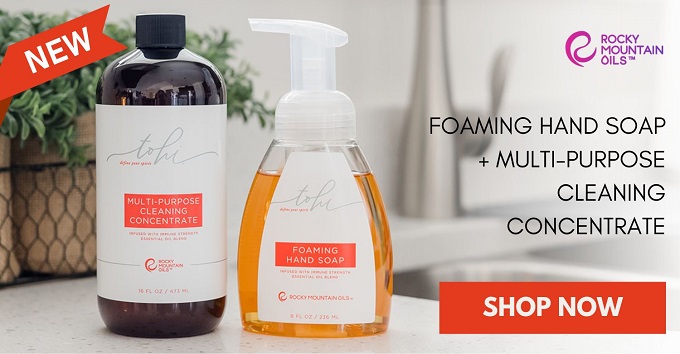
Leave a Reply